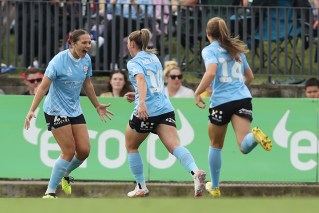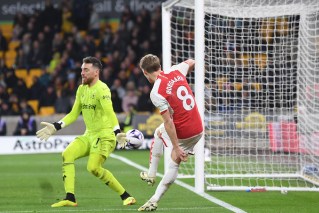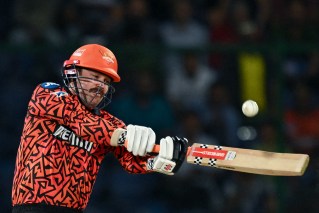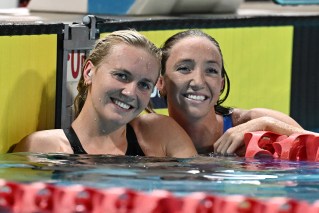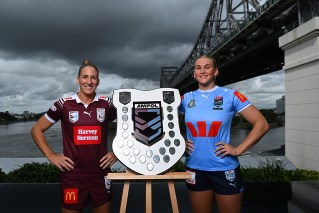Sporting events you may no longer be able to watch on free-to-air TV


Here's a list of sports you may no longer be able to watch freely from your couch at home. Photo: Getty
FIFA World Cup, Wimbledon, V8 Supercars races and many more major sporting events are under threat of no longer being broadcast on free-to-air television as part of a federal government media reforms package.
About 100 sporting events – including soccer, cricket, rugby league, rugby union, tennis, netball and golf – are pegged to be removed from a list which ensures their accessibility on free TV.
Monash University associate professor in media studies Brett Hutchins, who has an interest in sports media and culture, told The New Daily the proposed changes would “without a doubt undercut Australians’ access to watching sport”.
Events impacted under the Broadcast and Content Reform Package include the FIFA World Cup, English FA Cup, rugby league international Test matches, the rugby league World Cup, ODI cricket World Cup, T20 cricket World Cup, Wimbledon tennis, US Open tennis, some Davis Cup matches, Australian Masters Golf, Australian Open golf, the Masters, international Test netball matches and V8 Supercars Championship races other than Bathurst.
“Live sport content has always been important to Australians,” Professor Hutchins said.

The broadcast of FIFA World Cup matches will be impacted by the broadcast reform package.
“We’re seeing a change in the industry and millennials are not watching sport in the same way as other audiences.
“But if people can’t watch their sport for free then what I think we’ll see is that some will start to look at unauthorised means, like online piracy, of accessing that content.”
Victoria University screen media lecturer Marc C-Scott said the changes may also have other flow-on effects, such as Australian participation in certain sports.
“If people can’t afford pay TV, they will potentially lose out,” he told The New Daily.
“If all events of a particular sport were to go to pay TV, it limits the number of Australians gaining access to it.”
What are anti-siphoning laws?
The federal government has proposed the removal of about 100 sporting events from Australia’s anti-siphoning list.
The anti-siphoning scheme exists to protect viewers from having to pay to watch events of “cultural or national significance”, instead ensuring they remain available to Australians of all economic backgrounds on free-to-air TV.
The scheme achieves this by preventing pay TV from acquiring the rights to events on the list until they are acquired by a free-to-air broadcaster. It is otherwise automatically removed from the list 12 weeks before the event commences.
The package suggests this timeframe should be amended to 26 weeks.
The complete list of the proposed changes to sporting events can be viewed here.
Professor Hutchins said that while many events could be removed from the anti-siphoning list, that would not mean free-to-air TV channels would lose their right to bid. But they would face increased competition being up against pay TV, namely Foxtel.
Small portion of Australians pay for TV
Recent Roy Morgan figures show 90 per cent of Australians watch free-to-air TV, with about 43 per cent reporting they did not pay for any subscription service.
Just 1.4 per cent watched Foxtel alone, while 16 per cent watched a combination of free-to-air and Foxtel, and about 22 per cent watched both free-to-air and on-demand streaming services.
Mr C-Scott said it was important to remember that Australia only has a low penetration rate for pay TV and should not be compared to the US or UK markets, where between 50 and 80 per cent of their citizens favour pay TV.
“I don’t think people need to necessarily rush to get a pay TV subscription just yet. The main issue is competition,” he said.
“We only have one pay TV service in Australia, Foxtel. It is sort of a monopoly, really.
“It will be interesting to see how other platforms like Facebook and Twitter enter into that space. It’s going to be a very different viewing experience.”
As part of the broadcast reforms package, the government also wants to provide $30 million over four years to assist pay TV in broadening its coverage of sports that are rarely or never shown on TV. Free-to-air TV has been excluded from this arrangement.
Communications Minister Mitch Fifield told The New Daily that events being de-listed are “primarily those taking place overseas”, events without Australian teams or events with relatively low average audiences.
He said the reforms package would also lead to further gambling advertising restrictions during live sport.
“Free-to-air broadcasters will receive substantial financial relief with the abolition of outdated licence fees and introduction of a more modest spectrum charge,” he said.
“The government recognises that subscription television operates in a different environment and we did not want the broadcasting of women’s, niche and participation sports to be diminished, so these are supported over four years.”


